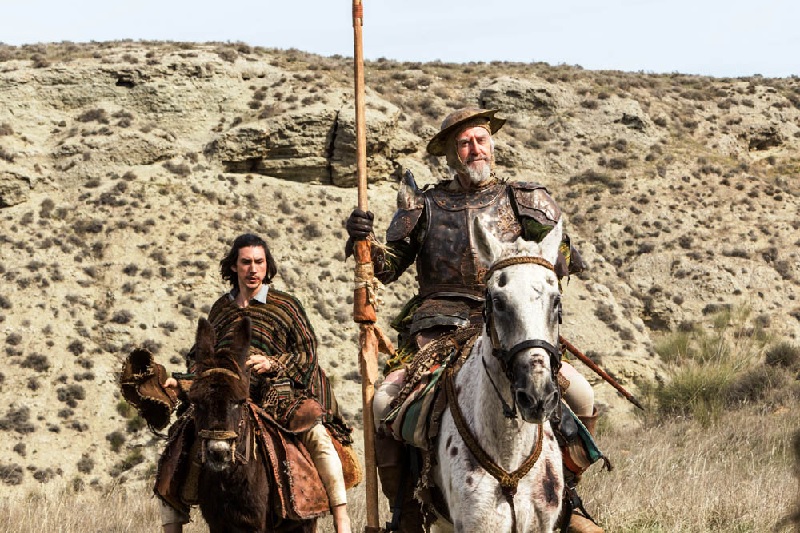Here is the short version of this review – watching The Man Who Killed Don Quixote made me happy. Terry Gilliam creates a specific kind of world that I’m happy to live in for a couple of hours at a time. Outlandish characters reacting to an insane reality with confidence amidst beautiful and vivid scenery. And I get to think a bit. Time Bandits scared the crap out of me as a kid, and made me think of good vs evil vs insignificance. Fisher King made me think about mercy and forgiveness. Jabberwocky made me think of… jabberwockies. Don Quixote does all of that.
I could end there, but since the movie took roughly a quarter of a century to get made, I’ll expand the thought. The movie is about a legend, Cervantes’s Don Quixote, the self-styled errant knight who sees giants where there are only windmills and has sworn to preserve the concept of chivalry. Gilliam has remarked it is the perfect story for him. It’s quests and delusions, disappointment and delight. But he would never make a straight adaptation, so he wraps the story around a modern tale of a director named Toby (Adam Driver) who is fumbling to create the perfect commercial for a vodka company. He had decided to film in Spain, which was a mistake, he says. He has chosen Don Quixote and his sidekick Sancho as the stars of the commercial. But it’s not working, and Toby doesn’t know how to fix it.
Early on, it’s hard not to see echoes of the legend of the film’s production on the screen and in the script, especially if you’ve seen the documentary, Lost In La Mancha, which details the last time Gilliam got close to finishing this film. Adam Driver’s character is named Toby Grisoni – Gilliam’s real-life screenwriting partner on the film is Tony Grisoni. Some of the set pieces on the commercial shoot look like pieces from the last set Gilliam had to strike. And when we see Quixote in full regalia, it is the suit originally designed for Jean Rochefort, whose poor health contributed to the downfall of that production. It feels like a film within a film within a film.
That starts to fade once Toby goes awol and finds the small town in which he once shot a student film about Don Quixote, and a roadside attraction with the film’s star, Javier, who now thinks he really is Don Quixote. When he sees Toby, he believes his sidekick Sancho has returned to him. From that point on, Quixote/Javier brings Toby, and the audience by proxy, into a fantasy world where noble deeds are duty and passion rules over all else. Toby just wants to get back to his shoot, but he feels some responsibility for turning a shoemaker into a lunatic, and for inspiring a young girl named Angelica to pursue fame, winding up a rich man’s plaything instead.
There are echoes of Fisher King as Toby tried to keep his head to help a mentally unstable knight resolve whatever issue he’s decided is his quest, just as Jeff Bridges’ Jack tried to help Robin Williams’s Parry. The film’s tendency to slide into and out of the 17th century also brought to mind Time Bandits. The castles and countryside feel like another world, and the costume design and sets are ornate and strange. A moon decoration on the wall puckers its lips. The Knight of Mirrors and his horse are covered in CDs that shimmer in the sun. Which is to say, there are moments of Peak Gilliam here.
Frequent collaborator Jonathan Pryce is magnificent as Quixote/Javier, chastising his Sancho to know his place as a peasant, to be less selfish, and even, at one point, just singing loudly to annoy him. His is a principled madness, and it’s a joy to watch him burst his seams.
The thin this film made me think about was how passion can be a curse. It dooms Javier to madness, Angelica to indentured servitude, and Toby an unfulfilled existence close to what he wants to do, but not close enough. This is driven home in the climactic scene, in which the evil vodka company jagov uses Quixote/Javier as entertainment for a party at his newly-acquired castles, convincing him he is fulfilling his quest with the aid of movie trickery. His spirit is broken when his passion is used against him, ridiculed and treated as mere amusement. But it is a curse he passes on to Toby, and maybe the only curse worth living with.
The screening I attended was a one-night only event, which fits nicely with the film’s snakebit timeline. I have seen references to a limited theatrical release somewhere down the road, but this might be the only chance we had to see it. You did see it, didn’t you? The movie? It was about a guy, a guy who saw things that weren’t…
